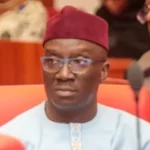Part 2, Section 4 of the 1999 Constitution, as amended, vests the legislative powers of the federation on the National Assembly which comprises of the Senate and the House of Representatives. The National Assembly has enjoyed stability since the return to democracy on May 29, 1999 making it exactly 15 years today.
Whereas most Nigerians believe that the parliament has not been able to live up to expectations, the lawmakers on their part contend that they have been able to deliver on their mandate, though blaming the executive arm which is saddled with the responsibility of executing and implementing the laws for inadequacies they have been accused of.
The Senate particularly has also not been altogether stable with the frequent change of leadership between 1999 and 2007 when it had no less than five different Senate presidents.
However, since June 2007 when Senator David Mark emerged as President of the Senate, the game of musical chairs stopped as they were able to serve the entire four-year tenure – 2007 to 2011. In an unprecedented show of solidarity, Mark and his deputy, Ike Ekweremadu, were returned unopposed in 2011.
Now, in the last one year, the Senate has had its good, bad and ugly moments.
Constitution review
One of the major assignments embarked upon by the red chamber at the beginning of the 3rd legislative calendar is the amendment to the 1999 Constitution. At the end of the 2nd calendar year, the Senate Constitution Review Committee led by Senator Ike Ekweremadu had concluded its report and in July, the MPs voted on the bill which is now awaiting concurrence with the House of Representatives. Clauses granting financial autonomy to local governments, and separation of the office of Attorney General of the Federation from that of the minister of justice and the six-year single term for the president and governors and many others were debated.
It was also during the constitution review exercise that a clause on the citizenship of women married to Nigerians became controversial with many Nigerians assuming, though wrongly, that the senators had endorsed underage marriage.
Boxing ring
On 3rd July, the Senate chamber was almost turned into a boxing ring when two senators attempted to exchange blows during a heated debate over President Jonathan’s rejection of a bill seeking to compel him to deliver a yearly state of the nation address.
Jonathan had in June last year written to the Senate rejecting the State of the Nation Address Bill as passed by the National Assembly. He proposed some amendments to make the address optional and allow him delegate someone to deliver it. When the matter came up for consideration, it degenerated into heated arguments and suddenly Senator Paulinus Nwagu Igwe (PDP, Ebonyi Central) was said to have made some remarks that did not go down well with Senator Kabiru Garba Marafa (ANPP, Zamfara Central), who in turn challenged Igwe. The duo exchanged blows but were separated by their colleagues.
Apo killings
On September 23, 2013, security agencies killed eight squatters in an uncompleted building near the legislators’ quarters in Apo, Abuja.
Seven people were killed on the spot in the shooting by security agencies who said they came under fire and returned it while digging out hidden weapons at a Boko Haram hideout. Again, a panel was set up under the leadership of Senator Mohammed Magoro to investigate the killings. Just like Baga, the upper chamber threaded an unpopular path exonerating the security agencies from any wrong doing. The National Human Rights Commission later indicted the government and the security agencies and awarded compensation for the victims and their families.
Emergency rule extension
In November, the state of emergency declared by President Goodluck Jonathan in Adamawa, Borno and Yobe states expired and the National Assembly unanimously approved another extension. But when it also expired this month, the legislators handed down to the President a set of eight conditions which they said must be implemented or they may be compelled to revoke the emergency rule.
Ripples from Rivers
Last year when Rivers State was enmeshed in deep political crisis, the Senate went to the rescue but soon got hit by ripples of the crisis which degenerated into near fisticuffs in the hallowed red chamber on January 23rd. It was the second time in one year such uproar occurred on the Rivers issue.
Trouble started yesterday during the presentation of a motion by Senator Wilson Ake (APC, Rivers), co-sponsored with 30 other All Progressives Congress colleagues, on the January 12 police attack on a political rally in Port Harcourt. That incident led to the alleged shooting in the chest of Senator Magnus Abe, also a member of the APC. The heated debate nearly resulted into exchange of blows between Senators Ahmad Lawan (APC, Yobe) and James Manager (PDP, Delta).
Anohu-Amazu bill
Mark’s Senate also threaded another unpopular path by lowering the years of experience required for a Director General of the National Pension Commission (PenCom) from 20 to 15 years, paving the way for the appointment of Mrs. Chinelo Anohu-Amazu as substantive DG. The controversial clause had attracted condemnations but the Senate Committee on Establishment and Public Service matters led by Senator Aloysius Etok (PDP, Akwa Ibom) turned in a report okaying the lowering of the bar which was approved by a handful of senators.
Missing $20bn probe
Following revelations by listed Central Bank of Nigeria Governor Malam Sanusi Lamido Sanusi that the Nigerian National Petroleum Corporation had not remitted about $20 billion into the federation account as proceeds from oil sales, the Senate finance committee was mandated to probe the allegation. Sanusi had testified before the panel standing by what he said. Although the report is yet to be submitted, the investigative hearing afforded Nigerians the rare opportunity of hearing from the two sides under live television.
Immigration recruitment deaths
The Senate on Tuesday received the report of its committee on Interior which investigated the death of 16 applicants on March 16 during a recruitment exercise conducted by the Nigerian Immigration Service (NIS).The Immigration jobs test on March 15 caused stampedes at various centres around the country, leading to the death of 16 applicants, with many others sustaining injuries.
The submission of the report by committee chairman Senator Atiku Bagudu (PDP, Kebbi) is coming two months late, after the inauguration of the committee charged with the mandate of unearthing the circumstances that led to the death of the applicants. During the investigative hearing in March, Board of Immigration and the Comptroller General, Mr. David Parradang, all laid the blame for the deadly recruitment exercise on the doorsteps of the Interior Minister, Abba Moro. But the minister, Comrade Abbah Moro, denied the allegations. The report is yet to be considered.
Jonathan’s new constitution bill
On 2nd April, the Senate began considering a bill which sought to give President Goodluck Jonathan powers to propose an entirely new constitution from the report of the ongoing National Conference.
The bill which was contained in the report of the Senate Constitution Review Committee, was presented by its chairman, Deputy Senate President Ike Ekweremadu.
It sought yet another amendment to Section 9 of the 1999 Constitution to make a fresh provision for the introduction of an entirely new constitution by the President. Ekweremadu was forced to withdraw the contentious clause after many senators expressed stiff opposition to the new bill, describing it as a “superfluous, unnecessary and ill-timed” and “backdoor” attempt to legalise the national conference.
It is not likely that the senators will achieve any much in the twilight of their tenure with the 2015 elections fast approaching even though they argued that one of the biggest challenges facing the National Assembly is the non-implementation of laws and resolutions passed by the executive.
The two chambers of the National Assembly will not be required to pass resolution by simple majority to override the president’s veto on bills once a bill stays with the president for 30 days without him assenting to it or returning it to the legislature for further amendment, it will automatically be considered to have been signed by him according to Section 58 which states thus: “Where the president neither signifies that he assents or that he withholds assent, the bill shall at the expiration of 30 days become law.”
 Join Daily Trust WhatsApp Community For Quick Access To News and Happenings Around You.
Join Daily Trust WhatsApp Community For Quick Access To News and Happenings Around You.


